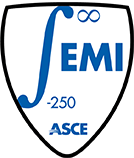Model-Data Fusion for Fatigue Damage Diagnosis and Prognosis
University of Vermont
Problems
It has been estimated that between 65-75% of all structural failures occur due to fatigue. Fatigue is broadly defined as material failure due to repeated and alternating load cycles. Fatigue failure can occur due to repeated application of a large number of small stress cycles and (or) by the occurrence of relatively small number of large stress cycles. Consider as examples a bridge deck subjected to millions of stress cycles during its service life or a building subjected to a few large stress cycles during the occurrence of an earthquake. In order to achieve efficient and reliable operation most structural systems need to be monitored for fatigue damage during their service life. Fatigue damage typically occurs at locations where stress concentrations and(or) defects are present, however the precise location where these will appear is uncertain because the location of defects is spatially random and loads can differ significantly from the assumed spatio-temporal distributions used in design. Our research group is working on the problem of using global vibration measurements to monitor fatigue damage and its uncertainty throughout the complete domain of a partially instrumented structural system. The estimated damage can be used for diagnosis and as an input for prognosis.
Approach
The two dominant sources of uncertainty when it comes to fatigue monitoring are: damage characterization and usage monitoring. Our most recent work focuses on usage monitoring, i.e. determining the time history of strain at a particular location of interest within a structure. The conventional approach relies on direct measurement of strain; however this is sometimes impractical since not all locations of interest can be instrumented due to logistical or economic reasons. Our approach relies on control theory and Bayesian model-data fusion. We have developed state estimation algorithms, tailored specifically for structural dynamics, which allow us to optimally combine or fuse a nonlinear finite element model with noise contaminated measurements in order to estimate any quantity within the finite element model without the need to measure excitation forces. This is especially useful for civil structures in which excitations can be seldom measured. We are currently in the laboratory and field testing phase of our research as well as improving the numerical efficiency of our algorithms. We have tested several metal structures in the lab with successful and encouraging results.
Findings
We have found that it is possible to estimate time history of strains at arbitrary locations of interest, given that one can prove that the quantity of interest is observable (in a control theoretic sense). This has been verified experimentally within the context of laboratory experiments at various scales. So far our test program has included metallic structures at the small and medium scales, as well as larger reinforced concrete structures at the large scale. We are currently performing fatigue monitoring in an operational bridge deck.
Impact
Our research could result in a new and more efficient way to monitor structures for fatigue damage, thus improving the reliability of our infrastructure systems. By requiring fewer number of global sensors, continuous remote sensing and monitoring could be achieved at almost all locations within a structure at reasonable costs. We envision applications in wind turbines, bridge decks, post earthquake damage assessment of building and bridges and aircraft structures, among others.
Core competencies
- Modeling response of structures subjected to dynamic actions
- Bayesian model-data fusion
- Statistical inverse problems in structural dynamics
- Structural health monitoring and diagnosis
Current research team members
- Eric M. Hernandez (Assistant Professor)
- Néstor Polanco (PhD candidate)
- Kalil Erazo (PhD candidate)
- Benjamin Leblanc (PhD candidate)
Research collaborators
- Dionisio Bernal (Northeastern University)
- Luca Caracoglia (Northeastern University)
Funding agencies
- National Science Foundation - CAREER Award
- Vermont Agency of Transportation


